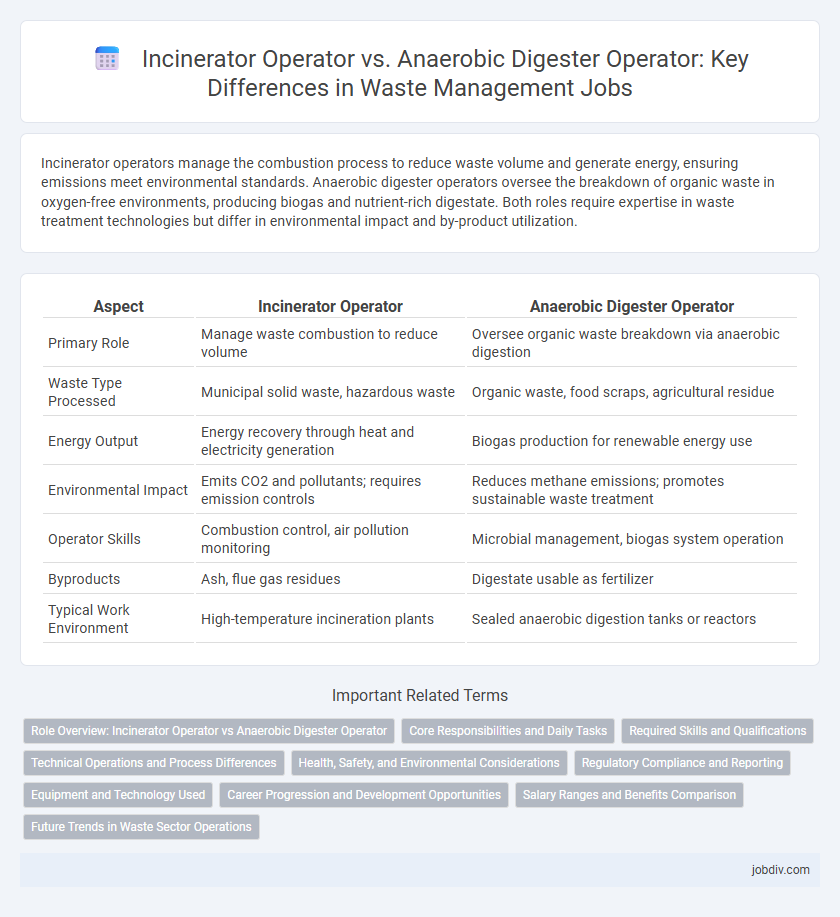Incinerator operators manage the combustion process to reduce waste volume and generate energy, ensuring emissions meet environmental standards. Anaerobic digester operators oversee the breakdown of organic waste in oxygen-free environments, producing biogas and nutrient-rich digestate. Both roles require expertise in waste treatment technologies but differ in environmental impact and by-product utilization.
Table of Comparison
| Aspect | Incinerator Operator | Anaerobic Digester Operator |
|---|---|---|
| Primary Role | Manage waste combustion to reduce volume | Oversee organic waste breakdown via anaerobic digestion |
| Waste Type Processed | Municipal solid waste, hazardous waste | Organic waste, food scraps, agricultural residue |
| Energy Output | Energy recovery through heat and electricity generation | Biogas production for renewable energy use |
| Environmental Impact | Emits CO2 and pollutants; requires emission controls | Reduces methane emissions; promotes sustainable waste treatment |
| Operator Skills | Combustion control, air pollution monitoring | Microbial management, biogas system operation |
| Byproducts | Ash, flue gas residues | Digestate usable as fertilizer |
| Typical Work Environment | High-temperature incineration plants | Sealed anaerobic digestion tanks or reactors |
Role Overview: Incinerator Operator vs Anaerobic Digester Operator
Incinerator Operators manage the combustion of waste materials to reduce volume and generate energy, focusing on controlling emissions and maintaining combustion efficiency. Anaerobic Digester Operators oversee the biological breakdown of organic waste in oxygen-free environments, producing biogas and nutrient-rich digestate while monitoring system conditions and gas quality. Both roles require expertise in environmental compliance, equipment operation, and process optimization to ensure safe and efficient waste treatment.
Core Responsibilities and Daily Tasks
Incinerator Operators manage the combustion process to safely burn waste, monitor emissions to comply with environmental regulations, and maintain equipment to ensure operational efficiency. Anaerobic Digester Operators oversee the biological breakdown of organic waste, control parameters like temperature and pH to optimize biogas production, and perform routine inspections to maintain digester health. Both roles require detailed data recording, safety protocol adherence, and coordination with waste management teams to ensure sustainable waste processing.
Required Skills and Qualifications
Incinerator Operators must possess expertise in combustion control, emissions monitoring, and equipment maintenance to ensure compliant waste thermal treatment. Anaerobic Digester Operators require knowledge in microbiology, biogas production, and process optimization for effective organic waste biodegradation. Both roles demand strong mechanical aptitude, safety awareness, and regulatory compliance understanding in waste management operations.
Technical Operations and Process Differences
Incinerator operators manage high-temperature combustion systems that convert waste into energy through controlled burning, requiring specialized skills in furnace temperature regulation, emissions monitoring, and ash handling. Anaerobic digester operators oversee biological waste treatment processes involving microbial decomposition of organic material in oxygen-free environments, focusing on maintaining optimal temperature, pH levels, and biogas collection. The primary operational difference lies in incineration's thermal oxidation versus anaerobic digestion's biochemical conversion, impacting equipment maintenance, emissions control, and energy output methods.
Health, Safety, and Environmental Considerations
Incinerator operators must manage high-temperature environments with risks of toxic emissions and exposure to hazardous materials, requiring stringent air quality controls and personal protective equipment to ensure health and safety. Anaerobic digester operators handle biological waste decomposition under controlled, oxygen-free conditions, necessitating careful monitoring of gas production to prevent methane leaks and ensure worker safety while minimizing environmental impact. Both roles demand adherence to strict regulatory standards to mitigate pollution, protect ecosystems, and promote sustainable waste management practices.
Regulatory Compliance and Reporting
Incinerator Operators must comply with strict air quality standards set by the Environmental Protection Agency (EPA), including continuous emissions monitoring and detailed reporting under the Clean Air Act. Anaerobic Digester Operators adhere to regulations concerning methane emissions and waste input documentation, following guidelines established by the Resource Conservation and Recovery Act (RCRA) and state-level environmental agencies. Both roles require precise record-keeping, timely submission of compliance reports, and proactive management of environmental permits to avoid penalties and ensure sustainable waste processing.
Equipment and Technology Used
Incinerator operators manage high-temperature combustion systems that burn waste to reduce volume and generate energy, utilizing refractory-lined furnaces, burners, and advanced emission control technologies like scrubbers and electrostatic precipitators. Anaerobic digester operators oversee biologically sealed digesters where organic waste decomposes in oxygen-free environments, employing biogas collection systems, mixing devices, and heat exchangers to optimize methane production. Both roles require specialized skills in maintaining complex machinery and monitoring environmental compliance through equipment such as gas analyzers and automated control systems.
Career Progression and Development Opportunities
Incinerator Operators typically advance by gaining certifications in hazardous waste management and facility supervision, with opportunities to manage larger plants or transition into environmental compliance roles. Anaerobic Digester Operators often progress through specialized training in biogas technology and process optimization, leading to positions in renewable energy management or environmental engineering. Both careers offer pathways into sustainability sectors, yet Anaerobic Digester Operators benefit from the growing emphasis on green energy solutions, enhancing long-term development prospects.
Salary Ranges and Benefits Comparison
Incinerator operators typically earn between $40,000 and $65,000 annually, benefiting from steady shifts and hazard pay due to combustion risks. Anaerobic digester operators usually receive salaries ranging from $45,000 to $70,000, with added benefits related to renewable energy incentives and environmental health bonuses. Both roles offer healthcare and retirement plans, but anaerobic digester positions often provide enhanced green industry career growth opportunities.
Future Trends in Waste Sector Operations
The demand for Incinerator Operators is expected to decline as stricter environmental regulations and the shift towards sustainable waste management favor anaerobic digestion. Anaerobic Digester Operators will see a rise in employment opportunities due to the growing adoption of bioenergy technologies and circular economy initiatives. Future waste sector operations emphasize decarbonization, resource recovery, and integrating smart monitoring systems that optimize anaerobic digestion processes for energy efficiency.
Incinerator Operator vs Anaerobic Digester Operator Infographic

 jobdiv.com
jobdiv.com